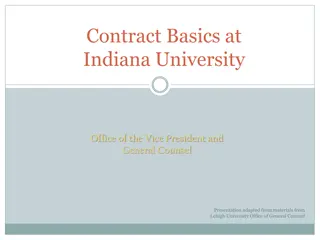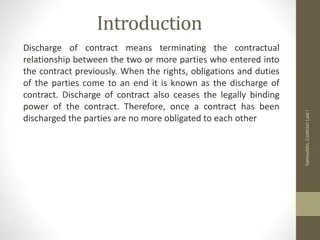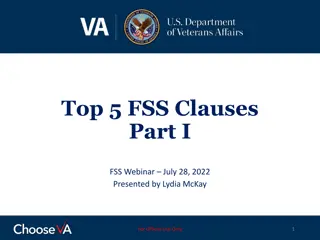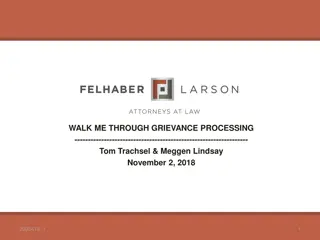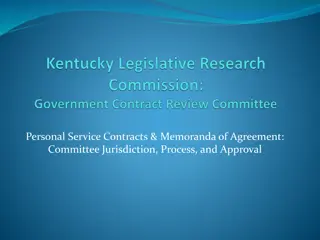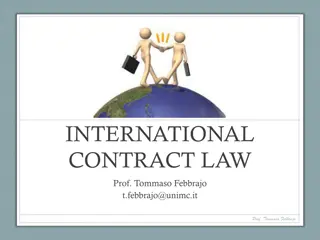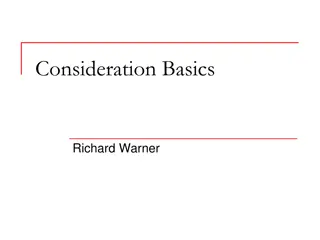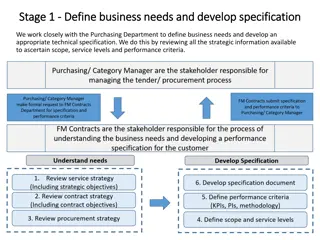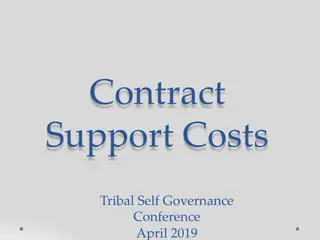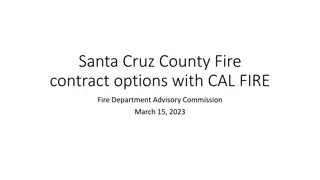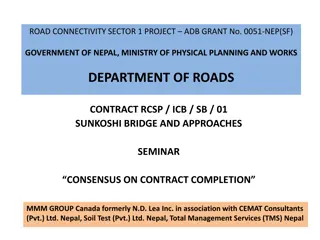Understanding Contract Law Fundamentals
Explore the core concepts of contract law, including creation of offers, termination, acceptance, and the essential elements required for a legally enforceable contract. Delve into the importance of distinguishing different ways contracts can be disputed and understand the rights of minors in voiding contracts. Gain insights into real property, personal property, fixtures, and contractual capacity. Dive deep into the nuances of genuine assent and the significance of offer and acceptance in forming agreements.
Download Presentation

Please find below an Image/Link to download the presentation.
The content on the website is provided AS IS for your information and personal use only. It may not be sold, licensed, or shared on other websites without obtaining consent from the author. Download presentation by click this link. If you encounter any issues during the download, it is possible that the publisher has removed the file from their server.
E N D
Presentation Transcript
Unit 2 Contract Law Unit 2 Contract Law Chapter 6 Offer and Acceptance (6.1 Creation of Offers; 6.2 Termination of Offers, 6.3 Acceptances)
Standards Standards BCS-LEB-4: Differentiates the ways that a contract can be disputed (e.g., fraud, nondisclosure, misrepresentation, mistake, duress, etc.). Explain a minor s rights to void a contract and identify people who lack contractual capacity. BCS-LEB-8: Define real property, personal property, and fixtures & explain why distinctions are important.
Goals Goals List the elements required to form a contract Describe the requirements of an offer
Essential Question(s) Essential Question(s) What is a contract? What elements are required to make a contract valid?
Because of limited resources, court system is selective in what it will enforce. Criminal laws and laws allowing recovery for certain private injuries (torts) are the highest on the list of enforcement which are necessary to keep the peace in society.
Creation of Offers Creation of Offers Contract An agreement between two or more parties that create obligations.
Requirements of a Legally Requirements of a Legally Enforceable Contract Enforceable Contract Six major requirements that must be satisfied before courts will treat a transaction as a legally enforceable contract. Offer and Acceptance Genuine Assent Legality Consideration Capacity Proper form
Offer and Acceptance Offer and Acceptance Must be an agreement composed of offer and acceptance. Offeror person making the offer. Offeree - person to whom the offer is made.
Genuine Assent Genuine Assent Agreement must not be based on one party s deceiving another, on an important mistake, or the use of unfair pressure exerted to obtain the offer or acceptance.
Legality Legality What parties agree to must be legal. Ex. An agreement to commit a crime or tort cannot be a legally enforceable contract.
Consideration Consideration Consideration - what the promisor demands and generally must receive in order to make the promise legally enforceable .
Capacity Parties must have the legal ability to contract for themselves in order to have a completely enforceable agreement. Age is one aspect of capacity; in most states, parties to a contract must be 18 years old in order to for a legally binding contract.
Proper Form Proper Form Some oral contracts can be legally binding and enforceable. Some agreements must be placed in writing to be fully enforceable in court.
Nature and Classes of Contracts Nature and Classes of Contracts Executed contract one that has been fully performed. Executory contract one that has not been fully performed; something agreed upon remains to be done by one or both parties.
Express contract all terms are expressly sated either orally or in writing. Implied-in-fact contract does not have its terms expressly stated but can be inferred from the parties acts or conduct.
A quasi or implied-at-law contract - not a real contract but a fiction created by the law to allow enforcement of a contractual remedy where justice alone warrants such remedy.
Unilateral contract offer promises something in return for the offeree s performance and indicates this performance is the way acceptance is to be made.
Bilateral contract one formed by a mutual exchange of legally binding promises. Offeror -merely expects a promise in return as acceptance to form a binding contract. Bilateral - is usually the legal shorthand for two or more parities making promises that form a contract.
Offer - proposed by an offeror to do something, provided that the offeree does or refrains from doing something in return. Offer is the basis of the bargain. If not valid, there cannot be a contract for courts to enforce.
Law examines what would be an offer carefully (3 items to look for) Contractual intent must be present in the offer. The offer must be communicated to the offeree. Essential terms of the offer must be complete and definite.
Contractual Intent must be Contractual Intent must be present present Words spoken in jest (or as a joke), in extreme terror or anger, or as a preliminary negotiation or social agreement would not be enforced.
Offer Must Be Communicated Offer Must Be Communicated to the Offeree to the Offeree Person who is not the intended offeree cannot accept the offer. A person cannot accept an offer without knowing.
Essential Terms Must Be Essential Terms Must Be Complete and Definite Complete and Definite Terms must be sufficiently complete and definite to allow a court to determine what the parties intended and identify the parties legal rights and duties.
Complete at a minimum, identify price, subject matter, and quantity either directly or indirectly to be legally effective. Ex. Sale of real estate (proper legal description, price, full terms of payment, delivery date of possession, delivery date for deed). Definite each essential term must be identified clearly.
6.2 6.2 - - Termination of Offers Termination of Offers How offers can end Revocation right to withdraw an offer before it is accepted. Not effective until communicated to the offeree.
Reasonable Length of time (depends on surrounding circumstances; usually courts will allow no more than 3 months) ; time should be specified at onset in order to avoid misunderstandings. Time stated to the offer (offeror may state how and when the offer must be accepted)
Rejection by the Offeree (when offeree clearly rejects the offer, the offer is terminated) Counter offer offeree changes the offeror s terms in important ways and sends it back to the offeror. (reject original offer and make another proposal).
Death or Insanity of Either party (offeror or offeree) eliminates contract and control by either parties. Destruction of the Specific Subject matter offer referred to unique subject matter is automatically terminated. (Ex. Card collection destroyed in a fire).
Uniform Commercial Code Uniform Commercial Code The uniform commercial code or UCC makes firm offers binding for the time stated, but no more than three months.
6.3 Acceptances What is required of an acceptance Determine what point in time is an acceptance effective
Acceptance occurs when a party to whom an offer is made agrees to the proposal. To create an enforceable contract, the acceptance must Come from the person to whom offer was made Match the terms in the offer Be communicated to the offeror
Only Offerees May Accept Only Offerees May Accept An offer made to one person cannot be accepted by another. Except an offer made to a group or general public and not to an individual (ex. Reward offer)
The Acceptance Must Match The Acceptance Must Match the Offer the Offer Mirror image rule requires the acceptance must match the terms contained in the offer. If the acceptance is not identical to the offer, it is a counteroffer.
Acceptance Must Be Acceptance Must Be Communicated to the Communicated to the Offeror Offeror Acceptance must be more than a mental decision; must be communicated.
Silence as acceptance One is not obligated to reply to offers made by other; therefore silence will not work as an acceptance to an offer. Promises as Acceptance Most offers can be acceptance by giving a promise instead of performing the contracted-for act. (ex. Bilateral contract seller promises to deliver a load of topsoil in exchange for the homeowner s promise to pay $65)
Performance as Acceptance Some offers, the offeror requires the offeree indicate acceptance by performing an action specified in the offer. Ex. Offeror may publicly promise to pay a $100 reward to anyone who returns a lost camera. A promise to look for the camera does not create a contract; only by the finding and returning, the specific performance required in the offer, can the reward be earned.
Modes of Contractual Communication Modes of Contractual Communication Contractual communications such as offers, acceptances, rejections, revocations, and counteroffers may generally be communicated in person or by other effective means. Telephone, text messaging, mail, delivery service, e- mail, texting, fax, and other methods. UCC provides that an acceptance of an offer to buy or sell goods may be in any manner and by any medium reasonable in the circumstances unless otherwise clearly indicated.
When Acceptances are When Acceptances are Effective Effective Comes in the form of a promise from the intended offeree or be the performance specified in a unilateral offer Match the terms of the offer And be communicated to the offeror in a proper and timely fashion.




